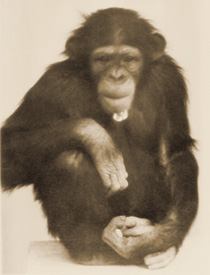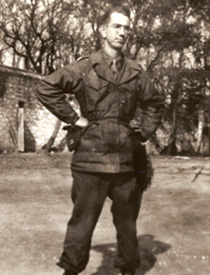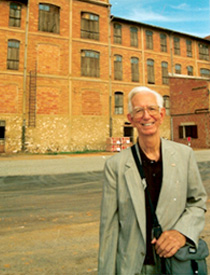
The Forty-First U.S. Army Engineer General Service
Regiments. (Singing Engineers) was an elite,
cadre-training unit manned by Black engineer soldiers during
World War Two.
The first battalion of this regiment, under the command
of Colonel John E. Wood, had been given the important
assignment of building roads, bridges, and docks in Liberia,
West Africa. The mission of this regiment was to give
engineering support to troops securing one anchor of the
last line of defense in the African campaign against the
Nazi General, Rommel.
Susie, a chimpanzee, a native of Liberia, was acquired as
a pet from a tribesman by Captain Brinkley. About a year
old, she quickly became everybody's pet and soon became the
official battalion mascot. There could not have been a
better morale booster for men operating in such a remote
area of the world.
I met Susie in 1942 when my battalion, the second
battalion was ordered to rejoin the first battalion which by
now had moved north from Africa to the island Corsica.
Captain Brinkley still owned Susie and saw to her welfare.
Shortly thereafter we were ordered to Southern France.
Susie, the only female member, was included in the order.
As regimental supply officer, my reputation was soon to
be tested by Miss Susie.
Late one morning, thick black smoke billowed from an old
abandoned tile factory near LeMille, France. Four of our
lieutenants had been lucky enough to commandeer one of the
offices to serve as living quarters complete with Army cots
and running water. Rushing to the room to see what was
burning, we found Susie sitting calmly on one end of a
furiously burning bed with three lit cigarettes in her
mouth. She had lit the cigarettes with a Zippo lighter and
then placed the flaming lighter on the bed covers.
Lieutenant Pribble, dousing the flames with a bucket of
water, scolded her severely and cuffed her ears. Susie
emitted screams of protest and indignation, but mostly of
hurt feelings.
Susie's reputation for misdeeds, especially pilfering,
was already not good. She frequently raided footlockers and
stole candy, cigarettes, and chewing gum. She often was seen
chewing enormous four-pack wads of gum.
My fellow officers were now looking to me to provide
protection from this undisciplined maverick. They expected
me to furnish padlocks so that there would be no more
repeats of this last fiasco. As I said, my mettle as a
supply officer was tested in this case. Of all the hardware
carried in the vast military supply system, padlocks were
not to be found, nor did the local French merchants carry
padlocks. I ended up writing to my wife in the States, who,
after considerable searching, found a dozen locks and sent
them to me for issue to the poor vandalized lieutenants.
What I am about to tell is unbelievable, but nevertheless
true. Each padlock had only one or two keys. Thus, after
installing the locks on the doors, the officers agreed to
place the key on the door ledge after locking the door and
leaving for the day's duty. This arrangement was
satisfactory for the first day only. On the second day, the
returning officers found not only the door unlocked and
open, but found Susie on the floor with three steel helmets
full of soapy water slushing neckties, socks, overseas caps,
handkerchiefs up and down in the water like a wash lady out
of control. What a terrible soapy, wet mess! It remained a
mystery how Susie had gained entrance. It could only be
surmised, but never fully proven, for no one would ever
admit, that one of the officers had shown Susie how to use
the key, or inadvertently, she had seen one of the officers
use the key to enter the room. While she was a clever
imitator, no one would ever dream she would have understood
the complete sequence of operations needed to enter the
room.
Susie had never been caged. She was indeed allowed
complete freedom to roam, even to visit alone the nearby
village of LeMille, visiting the bars, sometimes being
offered wine as she sat on the bar stool alongside of the
other drinkers. To get back to our bivouac when she was
ready, she would bum a ride in one of our passing jeeps or
some other military vehicle.
When Susie did her mischievous things, her victims
feigned disgust and issued warnings and threats to banish
her forever, but deep down they really liked Susie. After
the anger subsided all would be forgiven and forgotten until
the next episode which would not be long in coming. Susie
could melt your heart with her endearing ways; always quick
to greet you with a friendly outstretched hand; anxious to
give you a strong hug about the neck. On a chance meeting
she would reach for your hand and walk along with you
regardless of your destination.
Her blackest day came, when our new regimental commander,
Colonel Lapsley, called Captain Brinkley in "on the
carpet" and ordered that he "cage the dame monkey
now, this moment, and keep her under control, or else that
monkey must go." All that Brinkley could say was,
"Yes, Sir."
What precipitated this stern order, was Susie's entrance
that day into Lapsley's sleeping quarters. Upon finding a
fresh cantaloupe, she proceeded to dig a small opening with
her fingers and pumped the entire contents, seed and all,
over the clean bed clothes. Also while in the room, she
ingested all of Lapsley's precious vitamins and two bottles
of wine, breaking the bottle necks to pour the wine.
Within in the hour, a large cage was under construction
to restrain and house Susie.
Her pitiful plight evoked much sympathy from our men as
they passed by her cage all day. Susie pressed her nose
against the cage wire and with outstretched arms pleaded to
be freed. No one failed to give her a word of encouragement
and a tap on her fingers. The poor hapless animal, having
had her freedom so long, was now a prisoner.
While the sentence was harsh, Colonel Lapsley was
actually an ardent proponent of this animal. It was obvious
that he enjoyed the responsibility of commanding an elite
Army Engineer regiment; he also enjoyed being identified
with the unit that had such an unusual mascot. But this
cantaloupe and vitamin caper was messy and, admittedly a bit
too much.
With all the sympathy and empathy in the air, and with
those pleading brown eyes and outstretched arms haunting one
and all, the reader might guess that after three days
someone unlocked the cage door and Susie was free. We
watched for a reaction from Colonel Lapsley when he walked
through the assembly area a few hours later and saw Susie
appearing very happy to be free. Colonel Lapsley made
absolutely no comment, as though the sleeping quarters
catastrophe had never happened, and that it was normal and
necessary to see Susie in the open. With everyone now in his
proper place of duty, the regiment could now carry out its
vital war-time military mission.
Susie ate regular G.I. food, and always showed up at chow
time, either in the enlisted mess or in one of the officer's
mess tents. Interesting to me as a chemical engineer was
Susie's apparent intuitive ability to utilize the principle
of heat transfer. She enjoyed a warm cup of coffee. She
tested the coffee with her tongue and would then add
sufficient smooth pebbles, one or two at a time, adding more
as necessary, until she had adjusted the temperature to her
liking. Then she'd drink from the cup, dunking bread or
other morsels of food before eating them.
Occasionally stray dogs would show up encouraged by
G.I.'s eager to have a pet. Returning from a week-end pass,
one such soldier brought back with him a 3-week old puppy.
Susie spotted the puppy, and at first sight, her maternal
instinct was activated. She scampered over to the puppy,
stopped and cuddled him for a few minutes, and then to
everyone's consternation, grasped the puppy under one arm
and proceeded to climb the outside wall of the tile factory
building. Clinging to the fire ladder and downpipes, she
continued upward. After some 20-minutes, stopping from time
to time on window ledges to get a firmer grip on the puppy,
she reached the roof. She seemed to realize that the puppy
could no cling to her as a baby chimp would to its mother.
By now, a large group of soldiers had gathered to watch
this drama unfold. Some were betting that she'd drop the dog
before reaching the roof. Others were betting that she'd
leave the dog on the roof with no means of escape. But after
an hour of playful fondling of the puppy, she returned down
the sheer face of the building and deposited him safely on
the ground.
A number of ordinary snapshots had been taken of Susie,
but Captain Zahn, a regimental surgeon, felt we should have
an official photograph taken by a professional photographer.
Zahn lived to regret his decision to volunteer for this
outing to Aix en Provence, although he succeeded in
returning with the photos. The main difficulty was Susie's
insistence on being on the photographer's side of the
camera. Her curiosity could not easily be quelled when the
photographer placed her on a chair then covered his head
with the black light-blocking cloth. Each time the
photographer posed her on the chair and prepared to squeeze
the bulb, he found Susie not on the chair, but under the
cloth with him, twice collapsing the tripod and making the
photographer very nervous. Fortunately the camera was not
broken and Captain Zahn was relieved when his nerve-racking
session was over, to say nothing of the expression of relief
on the face of the photographer when he bid Zahn and Susie
adieu. Surprisingly, Susie was very photogenic and the
pictures turned out well. I had the honor of receiving one,
which I still possess.
Susie's out-going personality and friendliness, even to
strangers, was legend. One day, 30 U.S. Army signal corpsmen
came near our bivouac to install a cable. Susie was soon up
a telephone pole and appeared to be helping to string wire
with some tool a signalman had handed her. When the men
moved on to other poles, Susie remained behind on one pole
giving the appearance of being part of their team, the part
that remains behind to secure and anchor the wire as the
other team members go on forward to stretch the cable, or so
it seemed. This team operation went on for several hours
until Susie, becoming bored, descended, crossed the road and
came home. The signal corpsmen were surprised to have a
chimpanzee join their efforts, but they quickly accepted it,
and the interaction and nonchalant attitude of both the men
and Susie would cause a casual observer to believe it was an
every day occurrence for these people to be assisted by such
a special team member.
When Captain Brinkley announced one day that he had
received orders to leave the regiment and return permanently
to the States, having accumulated sufficient overseas duty
points, his friend, Captain Levi, agreed to
"adopt" Susie and supervise her welfare. For many
months, Levi had saved all of his dried fruit and most of
his gum and candy for Susie, the fruit having been sent to
him by his parents for his enjoyment.
Soon after Brinkley's departure, Levi was alarmed one day
when no one had seen hide nor hair of Susie. Levi, inquiring
of the French villagers, learned that Susie had joined a
British Army signal unit heading for the front lines. Levi
was frantic as he sought an audience with Colonel Lapsley
for help for a possible retrieval of the chimp. He requested
leave-of-absence to race northward in an attempt to overtake
the British unit. Levi was pleased when the Colonel granted
him 48-hours and permission to use one of the regimental
jeeps. But the order was clear that Levi must head back
after 24 hours to arrive no later than the end of the second
day.
Levi returned empty handed. His inquiries along the way
proved that he was on Susie's trail, but that he had started
too late in pursuit.
A month later, Susie was reported to be in the Marseille
zoo. One of the officers on a week-end leave was quite
certain that he recognized Susie in the ape division of the
zoo. Hearing this, Levi lost no time heading for Marseille
with a large bad of dried fruit he had been saving along
with candy bars and packs of gum. He returned shortly saying
that, yes, Susie was indeed in the zoo. Levi had appealed to
the keeper to allow him to enter the cage. The keeper, at
first, warned Levi that the chimpanzee was "Tres
ferrocious," but Levi convinced him to allow his
entrance to the cage. On entering the cage, it was instant
recognition and a joyful reunion. Susie jumped into Levi's
arms with screams of joy and held close to him. Levi left
the fruit, the candy, and the gum, and returned to our
bivouac.
Levi, while sad to give her up, was satisfied that Susie
would be fed and sheltered for the remainder of her days. We
all missed her.
I shall always have fond memories of Susie.
What a girl!
|






